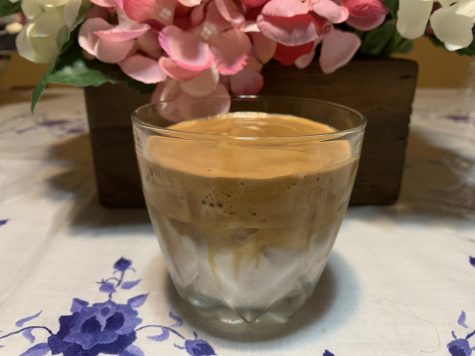Plastic Straws are Hurting the Environment
Opinion
Metal straws can be a more environmentally-friendly approach to your iced latte.
October 2, 2019
Plastic straws, the common little items made of synthetic polymer has been causing an uproar on the Internet. An estimated 500 million plastic straws are used every single day by consumers. Plastic is manufactured every day for human use to create products such as plastic packaging and toys. These products are thrown away seamlessly, piling up pollution in our oceans; hurting our environment. Plastic straws are a hazard to wildlife, sea creatures, and humans; therefore, we should ban the usage of plastic straws. Companies have already pledged to ban plastic straws by 2020 and so forth.
What is it about plastic straws that name brand companies such as Starbucks have pledged to ban? What would they be replacing the plastic straws with? Starbucks has stated that it plans on manufacturing plastic “sippy cup” lids. This defeats the purpose of banning plastic straws and creates more plastic waste. A better option Starbucks would be to change their plastic cups and lids into paper. Paper cups that have wax on the inside are biodegradable and recyclable! There is so much more these brands and companies can do to reduce the usage of plastic as a whole. By changing their packaging, it would greatly reduce our plastic pollution.
Now, plastic straws have begun to resurface as an issue of health to the environment and animal life, specifically sea creatures. In his article, “The Environmental Toll of Plastics,” Douglass Fischer goes in-depth to explore the damages plastic as a whole does to wildlife, human health, and our Earth. The article provides a list of health risks that come with throwing away plastic:
- Chemicals that come from plastic can be absorbed by human bodies, causing hormone alterations.
- Marine animals also digest plastic that floats in the ocean, absorbing the chemicals in plastic, which injures and poisons them.
- Plastic is not biodegradable, meaning that it can last for years and years without breaking apart. The downfall to this is most humans think of these plastics as a one time use, resulting in more waste in the ocean.
Plastic straws are not our biggest concern; it is plastic: plastic bags, plastic packaging, plastic utensils, and so forth. These products end up washed away on beaches and stay-a-float on the surface of our oceans every day. Sea creatures often cannot tell the difference between plastic and food; for example, to turtles, plastic bags appear as jellyfish, and when those turtles consume the bag, they can grow sick and even die. It remains in their bodies until they die from the chemicals that omit from the plastic. There have been videos surfacing the web of a turtle getting a big plastic straw taken out of its nose, bringing the harsh reality that, yes, these plastic straws need to be ridden of.
There are many organizations and campaigns such as Ocean Society, Plastic Pollution Coalition, 5Gysers, and many others that mainly focus on the dangers of plastic and how harmful they can be to the biosphere. There is so much damage that comes from plastic, it’s truly unbearable to see how much our Earth is suffering from such pollution.
As article after article pops up on the web, many consumers have begun to notice the damages plastic has done to our planet and have started to reduce their usage of plastic straws. Many consumers have been turning to alternatives: metal straws, paper straws, bamboo, edible straws, papaya leaf stems, glass straws, and get this, no straw! There are so many influencers online that have switched to using metal straws, hyping up the popularity of the item and purchasing them. I have seen many people post ads and sponsorships about metal straws on Instagram. The famous metal straws have been a trend for the past few months, and I too own a set of them. There also have been memes about using metal straws on social media, adding even more towards their popularity. Even though we are aiding in reducing the use of plastic straws, there are still harms that come with using alternatives.
The removal of plastic straws is an amazing feat, but we never took into account that there are people who rely on them heavily. Some people with disabilities have trouble drinking without them, and an article published in the Guardian “People need them: the trouble with the movement to ban plastic straws” by The Guardian, it brings light to this overshadowed issue. The argument is people need plastic straws, and banning them wouldn’t be the best option. In a section of the article, Vivian Ho interviews Alice Wong, a woman who faces physical disabilities. Wong explains that using plastic straws aren’t just used because they’re convenient, but because they are a necessity. Those with disabilities don’t always have people around to help them with regular activities, and with the removal of plastic straws, it would add more difficulty in doing everyday tasks.
I understand that if there is a total ban on plastic straws, people with disabilities who need to use these straws and rely on them will suffer, but there are alternatives they are able to use. As listed above, there are straws that are able to bend like plastic straws, such as paper straws, which are biodegradable, unlike plastic ones. There are also plastic straws that are created to be of use more than once called “fun straws” that allow for multiple uses, as it is made of harder plastic than regular plastic straws. Even though there are problems that arise from banning plastic straws, it can easily be fixed; plastic straws can always be replaced by better options that can help reduce plastic pollution in our oceans and environment.
Banning the use of plastic straws should be mandatory because it will minimize plastic pollution and thus benefit the environment. Even if there won’t be a huge impact, we are inching our way towards a cleaner and more healthy Earth. Not only could we manufacture healthier and biodegradable alternatives to plastic straws, we could also cut the use of plastic in half if we take easily replaceable plastic materials and turn them more environmentally friendly.



